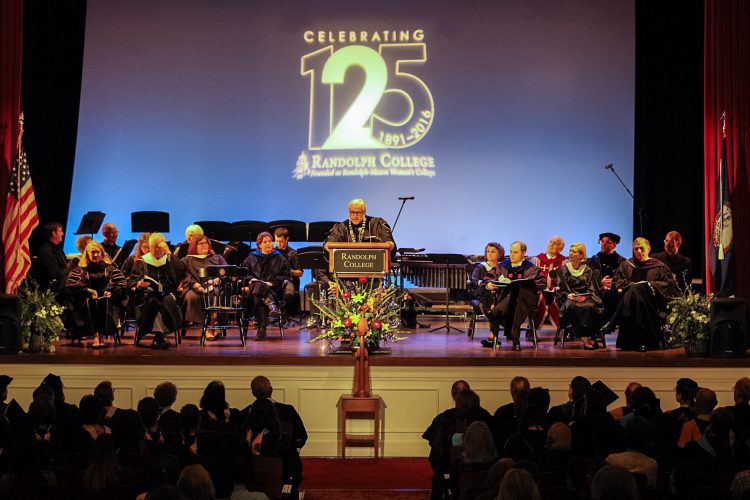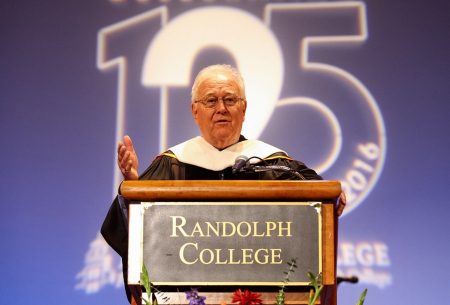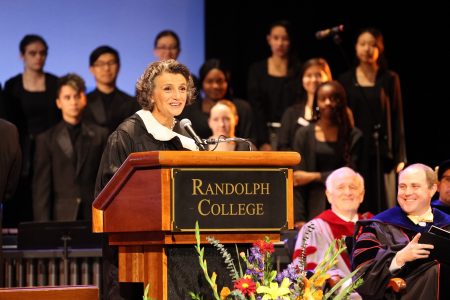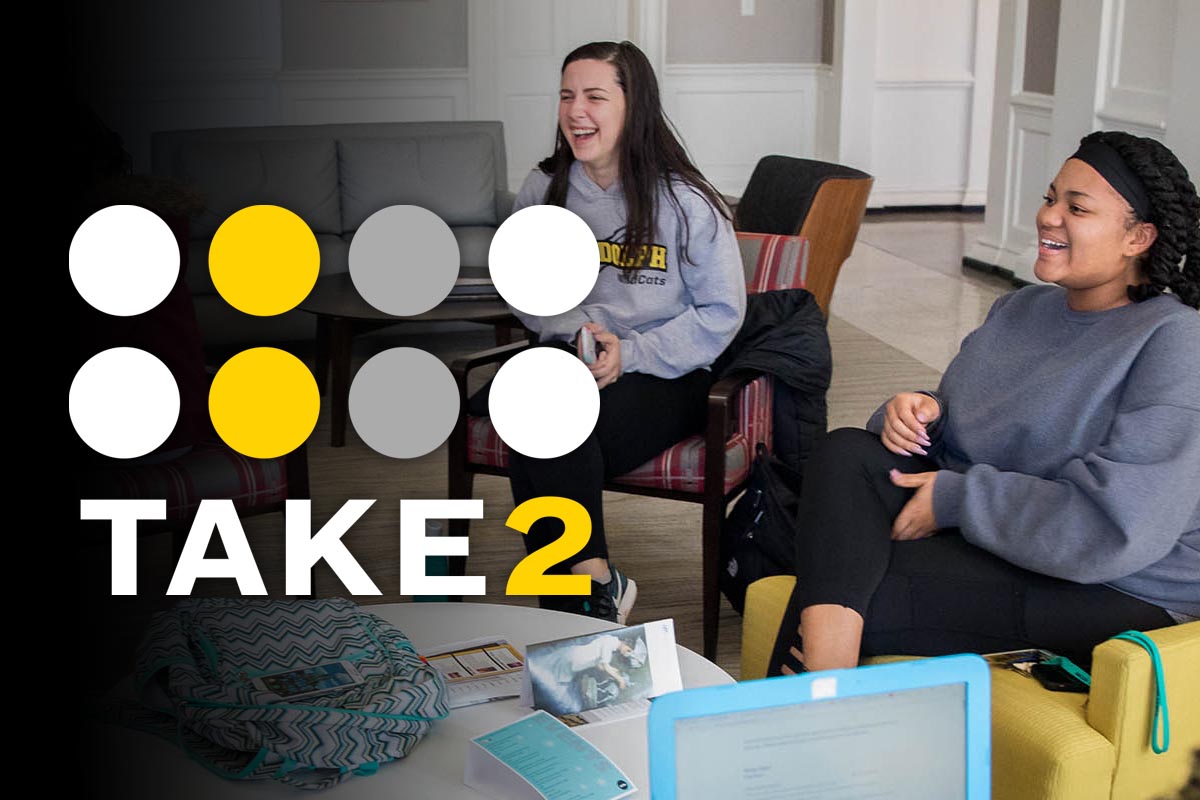College reflects on history, looks to future at 125th Anniversary Convocation

President Bradley W. Bateman speaks during Randolph’s 125th Anniversary Convocation.
Alumnae and alumni, current students, and leaders from throughout Randolph’s and R-MWC’s history gathered in Smith Hall Theatre Saturday for a culminating celebration of the College’s 125th anniversary.
A procession of delegates from each decade of graduating classes as well as current faculty members filed into the theatre, and Gordon Steffey, the Barbara Boyle Lemon ’57 and William J. Lemon Associate Professor of Religion and Philosophy and Division Head for Arts and Letters, opened the ceremony with an invocation.
Special music was provided by the Randolph College Chorale and the 125th anniversary brass and percussion ensembles. The groups performed musical selections inspired by William Waugh Smith, the College’s founder and first president, as well as notable alumnae. Lyrics for one piece, From the Good Earth, were inspired by the famous poem by Pearl S. Buck, a member of the Class of 1914 and winner of the Pulitzer Prize and Nobel Prize for Literature.

Keynote speaker David W. Breneman
President Bradley W. Bateman saluted the founders of the College.
“Today we are celebrating the success of an institution shaped by tens of thousands of people: by students and faculty, by staff and administrators, by trustees and philanthropists,” Bateman said. “All of these different kinds of people made the College what it is today. Each one brought their own influence and each one left their own mark.”
During his remarks, Bateman focused on four individuals who played key roles and exhibited outstanding bravery and leadership in different time periods in the College’s history. The first was Smith, who was responsible for not only securing funding to open the College, but also stepping up as a leader when he agreed to serve as its first president as well as the chancellor of the entire Randolph-Macon system of colleges and schools. The second was Louise Jordan Smith, William Waugh’s cousin and the College’s first art professor. She established studio art courses and the Annual Exhibition of Art, which continues today. William F. Quillian, Jr. was the College’s longest serving president, and welcomed R-MWC’s first black students, despite backlash from the community as well as others in the College’s administration. Most recently, Jolley Bruce Christman ’69, a trustee emerita, served as president of the Board of Trustees when the College made the difficult decision to adopt coeducation and change its name.
“Each of us associated with this College has a distinguished heritage of which we rightfully take great pride,” Bateman said. “We are proud, not because every moment is glorious or every act noble. We are proud because when the moment comes, we have always found a way to act as a community to extend and enhance freedom. This is our great history and it is our best future.”
David W. Breneman, president of the Society of the Four Arts in Palm Beach, Florida, and professor, emeritus, in economics of education and public policy at the University of Virginia, delivered the keynote, “The Liberal Arts.” He spoke about the origins of liberal arts education in ancient Greece and Rome and how this style of education has progressed through the years. Breneman was impressed by Randolph’s positive trajectory and excellent leadership in what is a challenging time for small, liberal arts colleges.
“Your strategic plan seems sensible and well done. You have a very strong academic reputation, and I would advise you to guard that religiously,” Breneman said. “Based on what I have seen, the future of this College appears bright, and I’m just delighted I was able to escape the wrath of Hurricane Matthew and be with you here today.”

Lynchburg Mayor Joan Foster
Others from the community shared in the celebration with special wishes to the College. The Reverend John B. Peters, executive director of the Association of Educational Institutions for the Virginia Conference of the United Methodist church, spoke about the College’s longstanding connection to the church and Randolph’s strong emphasis on community service. Lynchburg City Mayor Joan Foster also credited Randolph and its students for contributions to the area over the years.
“Randolph is an important part of the Lynchburg community,” Foster said. “You have encouraged your students to go beyond the Red Brick Wall and become a part of the greater community through volunteerism and involvement. Whether it is mentoring and tutoring some of our youngest citizens or spending time with some of our elder residents, Randolph students are making a difference and we appreciate all that you do.”
In addition to the Convocation ceremony, the College invited alumnae, alumni, and members of the College community to a production of the Greek Play, The Frogs, a Homecoming tailgate during the women’s and men’s soccer games, and a Birthday Party featuring delectable desserts, dancing, and a video DJ.
For more information about Randolph College’s history and its 125th anniversary, please visit http://web.randolphcollege.edu/125/.
Tags: 125th anniversary, alumnae, alumni, Bradley W. Bateman, community, convocation, David W. Breneman, events, President's Office, speakers
